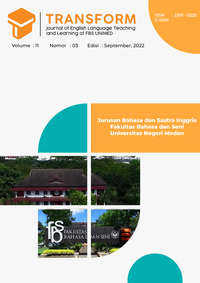The Functions of Language Analysis on Oral Tradition Tangis in Karonese
DOI:
https://doi.org/10.24114/tj.v11i3.44034Keywords:
Karonese, Language Functions, Oral Tradition, Roman Jakobson, TangisAbstract
This research deals with the analysis of language functions on oral tradition's Tangis in Karonese. The aim of this research is to: (a) describe how language functions are realized on oral tradition's Tangis in Karonese and (b) explain the reason why language functions are used on oral tradition's Tangis in Karonese. This research was conducted by using the descriptive qualitative method. The data of this research is taken from the utterances spoken by the pilgrims when did the Tangis. There are five language functions found in Tangis from the six language functions proposed by Roman Jakobson. They were referential 54,1%, conative 32,4%, emotive 8,1%, phatic 2,7 %, and poetic 2,7%. Besides the language functions found, there are also the reasons the language functions are used on oral tradition's Tangis in Karonese. They were thoughts, feelings, needs, and observation.Downloads
Published
2023-03-11
Issue
Section
Articles
License
Copyright (c) 2023 Sri Ramayanti, Zainuddin Zainuddin

This work is licensed under a Creative Commons Attribution-ShareAlike 4.0 International License.
Authors who publish with this journal agree with the following terms:
- Authors retain copyright and grant the journal right of first publication with the work simultaneously licensed under a Creative Commons Attribution License that allows others to share the work with an acknowledgment of the work's authorship and initial publication in this journal.
- Authors are able to enter into separate, additional contractual arrangements for the non-exclusive distribution of the journal's published version of the work (e.g., post it to an institutional repository or publish it in a book), with an acknowledgment of its initial publication in this journal.
- Authors are permitted and encouraged to post their work online (e.g., in institutional repositories or on their website) prior to and during the submission process, as it can lead to productive exchanges, as well as earlier and greater citation of published work (See The Effect of Open Access).
- This work is licensed under a Creative Commons Attribution-ShareAlike 4.0 International License.

This work is licensed under a Creative Commons Attribution-NonCommercial-ShareAlike 4.0 International License.



